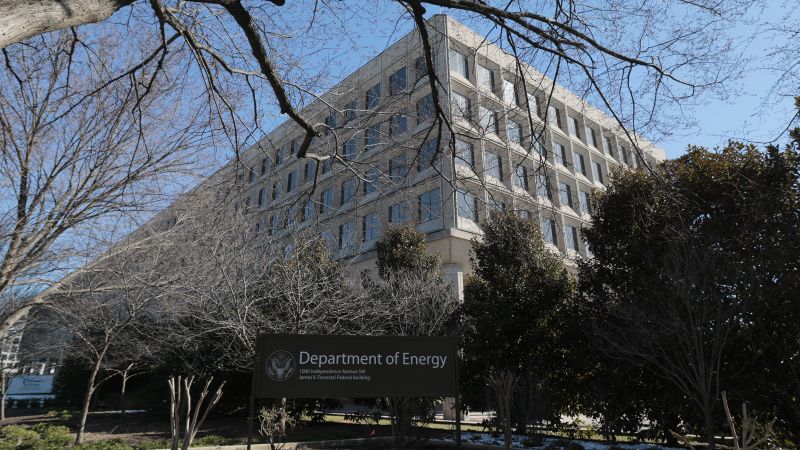CNN
—
Trump administration officials scrambled through the weekend amid a flood of criticism to claw back employees they fired Thursday evening at the National Nuclear Security Administration, four people familiar with the terminations — and their fallout — told CNN.
More than 300 employees were initially fired at the agency that is tasked with managing America’s nuclear weapons. All but around 25 NNSA staffers have since been reinstated, two current NNSA employees with knowledge of the matter told CNN. It is unclear how many will return to work Tuesday.
The firings created days of chaos inside the agency. Officials backtracked on the terminations Friday after multiple members of Congress petitioned Energy Sec. Chris Wright to reverse course, explaining the dire national security implications.
Some of the initially fired employees included NNSA staff who work at facilities where nuclear weapons are built, oversee contractors who build nuclear weapons and who are responsible for inspecting those weapons.
Many of the employees affected hold a “Q” security clearance within the Energy Department, meaning they have access to nuclear weapons design and systems. It also included employees at NNSA headquarters who write requirements and guidelines for contractors who build nuclear weapons.
The agency’s human resources department was not involved in the firings, which was a highly unusual aspect of the terminations, a person familiar with the firings said. That decision left managers to find the fired employees’ personal contact information to tell them their jobs were safe — a huge logistics and personnel hurdle given emails were shut down and government-issued phones turned off.
“That’s not normal,” an NNSA employee familiar with the firings told CNN. “It was ridiculous, unprecedented and sloppy. There’s no formal process.”
One NNSA employee who was fired on Thursday and reinstated a day later confirmed HR wasn’t involved. The employee told CNN they lost their access to their government email and personnel files Thursday night, before they were even told they were being fired.
“I didn’t think I would be fired until it happened,” the employee said, adding NNSA’s workforce initially believed they would be exempt from the executive orders and memos that focused on cutting the overall number of federal workers.
Those memos “all had a national security exemption, and we thought surely the NNSA with national security in the name would be exempt,” the employee said.
The terminations being executed before a long holiday weekend has also “stymied” the process of notifying people they’ve been reinstated and getting them back in the system, one person familiar with the incident told CNN.
A spokesperson for the Department of Energy did not answer questions from CNN about how many NNSA staffers had been informed they would be reinstated, or whether reaching those former employees was proving difficult. An Energy Department spokesperson on Friday disputed that more than 300 employees were affected, telling CNN that “less than 50 people” were “dismissed” from NNSA, and that the dismissed staffers “held primarily administrative and clerical roles.”
Managers at NNSA received a list of fired employees who needed to be recalled after 6 p.m. Friday, one person said, and NNSA officials worked through the weekend to make contact with the fired employees.
Emails were sent to personal addresses with a memo that read: “This letter serves as a formal notification that the termination decision issued on February 13th, 2025 has been rescinded effective immediately. As a result, your employment with the NNSA remains active and you’re expected to resume your duties as assigned.”
The firing of so many employees critical to America’s national security and global nuclear security shows how the administration is rapidly executing its quest to reduce the size of the federal government without understanding the full impact of its actions.
While there is no immediate evidence NNSA’s overall mission had been compromised as a result of the administration’s terminations, some within the agency believe there will be long-term consequences.
“The main impact was a hit to the morale and trust of the employees who were terminated,” one source said.
Some may return to work, but the lack of job stability under an administration that has said its goal is to shrink the federal workforce may prompt some to start looking for new jobs in the private sector, the source said.
“These folks who were called back worry does this mean if we go into some sort of reduction in force?” the source said. “Will they be tapped then?”
Larger fears loom: Some in the agency are worried about future incursions by Elon Musk’s DOGE into NNSA’s highly classified work.
“What do I do if someone with no need to know comes and says, ‘I need to see this file on Ukraine, or warhead design?’” an NNSA employee posed. “The idea of turning over sensitive or classified data versus losing your job? People are deeply alarmed and don’t feel the answers they’ve been given are sufficient.”
Others are afraid of retaliation by the administration and political appointees at the agency, fearing they could be targeted for causing embarrassment for the “vengeful” president,” another source said.
The Trump administration’s government-wide plan to reclassify some non-political employee positions as presidentially appointed positions would be particularly concerning at an agency like the NNSA, where nuclear safety and security has traditionally been done without political interference, according to a Department of Energy source.
NNSA is heavy on non-political employees to ensure stability and continuity across administrations as it manages the nuclear stockpile. And if the most senior staff are replaced with political appointees, international partners would likely see the lack of continuity from administration to administration as a sign of instability, one source told CNN.
“The world likely would not feel like they could depend on the US to be a stable nuclear holding nation,” the person said, adding that if the US loses any of its influence or leadership in this space, “the proliferation of nuclear technologies is the unintended consequence.”
